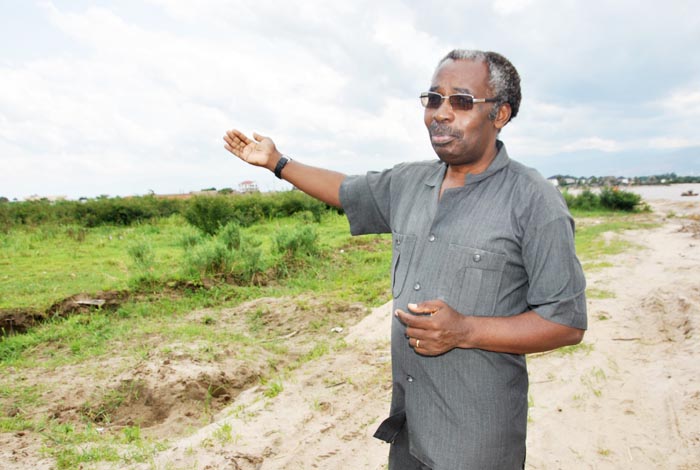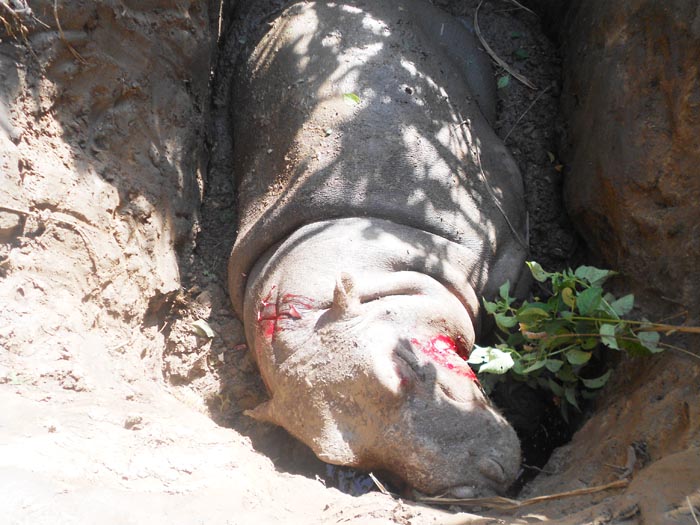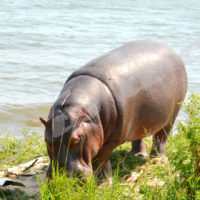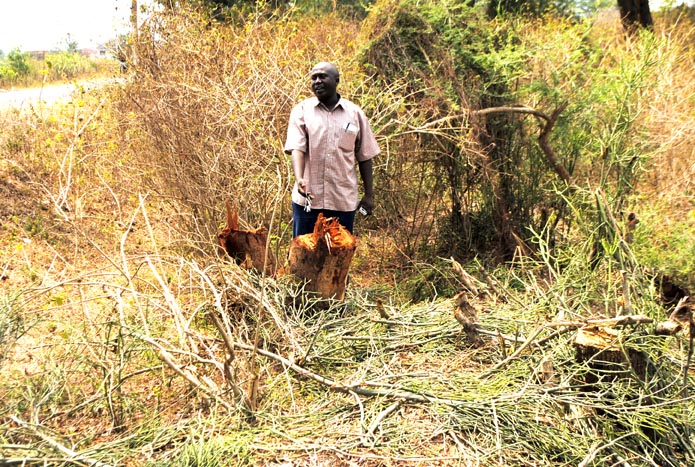Fauna is very threatened at Rusizi National Park. Since 17 September 2013, eight hippopotamuses have been killed by people living around the park. If the killing continues, hippopotamuses will probably disappear like elephants and lions. Today, crocodiles are also among the endangered species.-By Lorraine Josiane Manishatse
Located at a dozen kilometres of Bujumbura downtown, the Rusizi National Park covers a land area of 10 663 hectares as drawn by the Presidential Decree of 14 November 2011. It includes the palm sector of Rukoko, the Rusizi Delta and the corridor of the Great Rusizi. As far as the fauna’s richness is concerned, there are between 500 and 1000 hippos, a Nile crocodile which is now among the endangered species. It is worth mentioning that there is only one remaining crocodile in the whole park. There are also, migratory and sedentary birds from Europe, Asia and Southern Africa, antelopes called sitatounga (Inzobe in Kirundi) and tragelaplius scriptus (Impongo in Kirundi) living in the humid environment. Many experts in fauna say that fauna is terribly threatened by poachers everywhere in Africa. According to Jean Claude Ndayishimiye, Senior Warden of Rusizi National Park, since 17 September 2013 up to now, eight hippos have been murdered in different areas of Rusizi National Park, at Vugizo, Kagaragara, Kabezi and Gatumba. “People from Imbo Region like to eat meat very much; this is the reason why they often trap hippos. They often dig big holes to catch hippos which usually get out from water to the shore for grazing and kill them with different weapons,” he explains. For Albert Mbonerane; Activist in Environment, the challenge is that people are not aware of the importance of biodiversity. “I have always thought how I would have reacted if I had been treated like a hippo?” he states.
He indicates that they should leave spaces so that animals could live easily. The new Water Code stipulates that people should leave the distances of 1000 m from parks, 150 m from Lake Tanganyika and 50 m from rivers. Unfortunately, that code is not respected as animals’ habitats have been destroyed. When hippopotamuses get out of water for grazing, people complain that they destroy their fields and they unjustly kill them whereas it is their right to live there. “There seems to be a sort of people and administration’s carelessness,” deplores Mbonerane.
“I often observe how many foreigners are amazed when they see hippopotamuses in Burundi because they don’t exist in their country. But, we who have the chance to get them, we kill and mistreat them instead of protecting them,” he adds.
What about CITES law?

Albert Mbonerane, Activist in environment “Hippos are beings which should have the right to protection as long as the International convention is concerned….©Iwacu
CITES law is an International Convention on Trade of wild threatened and endangered Fauna and Flora species as signed at Washington on 3rd March 1973 and implemented in Burundi on 6th November 1988. The purpose of this act is to adopt measures to protect certain species of wild fauna and flora against over-exploitation up to international commerce. According to Ndayishimiye, CITES law is often violated in Burundi. “Now there is only one Nile crocodile in the whole Rusizi National Park. However, there are some crocodiles kept in many houses or pubs in Bujumbura without permission. This shows that animals are not protected in Burundi; they are commercialised without any problem,” he regrets. He highlights that the country’s fauna richness will disappear if nothing is done to protect the remaining animals. Once hippos will disappear according to Mbonerane, it will be a shame for this generation who are not taking care of our richness on one hand. The future generation will learn through history that biodiversity in Burundi have been destroyed by their grandfathers on the other hand.
“Hippos are beings which should have the right to protection as long as the International convention is concerned. I belong to that generation who have done a lot so that biodiversity and Lake Tanganyika’s richness survive for the well being of the future generations. I want our children and grand children to see many hippos and enjoy them up to 2025 vision,” he states.
Strong support is needed very much
Mbonerane calls upon all Burundians to do something when it is possible so that they won’t regret later. For him, INECN which is an Institute in Charge of preserving Protected Areas has a difficult work because it can’t reach its goal without the administration’s support and population’s contribution.
“Burundi has ratified CITES law which consists of protecting wild fauna in protected areas. It is very good for the country, but INECN doesn’t have enough means to protect them efficiently; so, everybody’s participation is necessary,” he adds. Jean Claude Ndayishimiye, Senior Warden of Rusizi National Park indicates that the Ministry of Environment in collaboration with INECN, is preparing a strategy of decreasing hippos’ poaching in particular, and all animals of the park in general. He asks the Burundian population, police and administration to collaborate very effectively in the protection of biodiversity. “I request the justice authority to be severe if someone is caught threatening biodiversity because wrongdoers are not fined or punished as harshly as possible,” he concludes.


















 IWACU Open Data
IWACU Open Data

